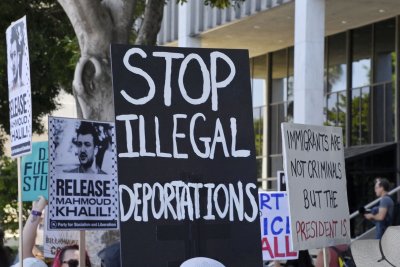April 24 (UPI) — A federal judge in Maryland on Wednesday granted the Trump administration’s request to delay answering questions about the illegal deportation of Kilmar Abrego Garcia.
U.S. District Judge Paula Xinis issued her brief order after reviewing both the Trump administration’s request for more time and Abrego Garcia’s response.
Xinis gave the Trump administration until April 30 at 5 p.m. EDT to file discovery in the case.
The order came a day after Xinis accused the Trump administration of purposely trying to evade revealing details about Abrego Garcia’s illegal deportation to El Salvador amid ongoing litigation on the matter.
The Trump administration deported Abrego Garcia, along with hundreds of others accused of being affiliated with gangs, to El Salvador, where they have been detained in the notorious Terrorism Confinement Center.
Amid the ongoing litigation over Abrego Garcia’s deportation, which some have described as an abduction, the Trump administration admitted it erroneously sent the Maryland resident to El Salvador.
Both the Supreme Court and a Maryland court judge have demanded that the United States “facilitate” Abrego Garcia’s return home. However, the Trump administration has tried to publicly smear the man, arguing online and in press conferences that he is an MS-13 gang member and that they will not secure his release from the Central American nation.
Despite its use of social and traditional media to try and frame Abrego Garcia as a gang member, the court has asked for proof, which the Trump administration has objected to provide on several grounds — many of which Xinis rejected Tuesday while accusing it of willful obstruction.
“Defendants have failed to respond in good faith, and their refusal to do so can only be viewed as willful and intentional noncompliance,” she said in her order.
The Trump administration has objected to discovery by questioning the courts’ rulings, making assertions of privilege and simply objecting to doing so.
Xinis, in order, said, “This ends now.”
“For weeks, Defendants have sought refuge behind vague and unsubstantiated assertions of privilege, using them as a shield to obstruct discovery and evade compliance with this Court’s orders. Defendants have known, at least since last week, that this Court requires specific legal and factual showings to support any claim of privilege. Yet they have continued to rely on boilerplate assertions,” she said.
“If Defendants want to preserve their privilege claims, they must support them with the required detail. Otherwise, they will lose the protections they failed to properly invoke.”
She had given the Trump administration until 6 p.m. Wednesday to respond, but granted them another week.
